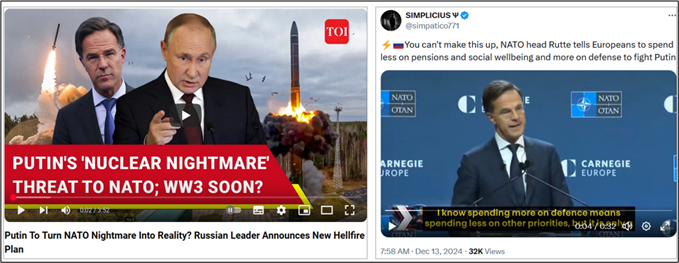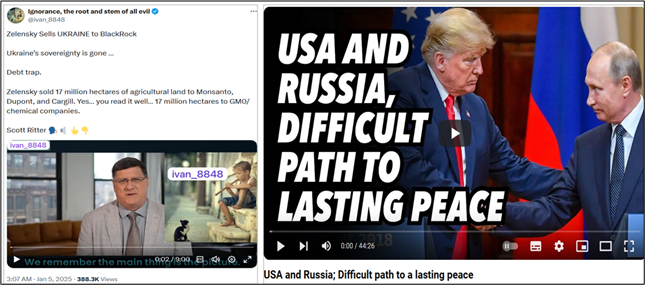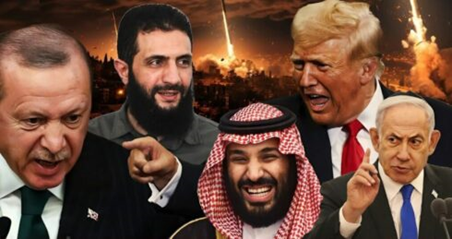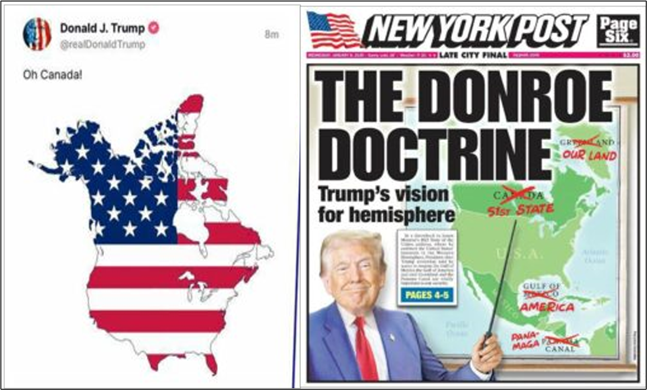Big Picture at the turn of the year 2024 / 2025
Overall Big Picture
Introduction
The entire 2020s has been, is and will be characterized by global struggle between “retaining unipolarity” by West Camp (neoliberals in the US and Europe and their allies) versus “promoting multipolarity” by East Camp (China, Russia and their allies).
The Ukraine war as well as latest skirmishes in the Middle East and military events around Taiwan are not merely tragic conflicts between neighboring nations but flashpoints in the global struggle between a faltering unipolar order and the rise of multipolarity. While the Western media frame these conflicts according to their simple narrative, a closer examination reveals a more complex reality.
The balance of military capabilities is changing significantly during the whole 2020s and in favour of East Camp. The real turning point will be in the early 2030s.
Now, in January 2025, we will have a possible big turning point as well, the date of Trump inauguration, January 20. What will be those Executive Orders, he will make in the first day of office, may be historical and momentous. Remains to be seen.
Theoretical framework
The collapse of Soviet Union (1990) moved the world system from the bipolarity to the new world order based on the unipolarity, the US-led unilateral world order with market economy and liberal hegemon. The first post-Cold War decennium was characterized by optimism, hopes, values and views of the better and safer future, at least among Western countries.
Historian Francis Fukuyama wrote an article: End of History in the National Interest 1989 (which later was published in the form of the book: End of History and The Last Man, 1993). Fukuyama’s main themes were that after the Cold War, the ideological development is ending, market economy and democracy based on Western liberal values will become as global societal order.
In 1993, as a reply to Fukuyama, Samuel Huntington wrote an article in Foreign Affairs (Summer 1993): Clash of Civilizations. According to Huntington, the ideological confrontations may step down aside but instead come cultural and religious value contradictions, which cause clashes between civilizations.
There have been much discussions and argumentation, both among scientists and scholars as well as in public media that the world moved from hard geopolitical and power politics to soft power world. It is clear that Fukuyama’s end of history lasted 20 years and ended by Putin’s prophetic speech in Munich 2007, which started an era of turbulence and slow transformation process accelerating and culminating in 2022 Ukraine crisis. Huntington’s clash of civilizations did not take place either as such but something much bigger is now emerging, a clash of “two world camps”.
In this framework of great powers, numerous processes, both external and internal, began to transform “the minds and people” around the world. The humanity seems to be divided in two camps:
The Western Camp, “Axis of US Empire” (the US and its allies Canada, EU and other West Europe, Australia, New Zealand, Japan, South Korea) and The Eastern Camp, “Axis of Resistance” led by China and Russia and their close allies Iran and North Korea, CIS and CSTO countries, covering majority of Asia, Africa and South America, so called “Global South”.
The eastern group consists of the majority of humanity, both in terms of countries and people. The ratio is six billion people in the east and to one billion in the west. No doubt, which camp will prevail. The leadership will shift to the east and remain there well into the next century.
Ominous events looming around the world
The status quo is the accepted political term for unresolved global crises, most of which date back to the WW2. Several status quo situations continue to prevail around the world: the Korean peninsula, the Taiwan Strait, Japan – Russia relations, China – the US relations and Western Sahara are just a few examples of these frozen or latent conflicts. Until recently, the NATO eastward expansion and Palestinian question also fell into this category. In essence, it means that there is a more or less tacit agreement between rival great powers to keep the crises in question frozen.
To resolve these crises on stand-by, China advocates recourse to international law i.e. resolving the status quo by legal means. The United States, on the other hand, seeks to short-circuit legal procedures, in order to unilaterally impose new geopolitical realities through the use of force. Thus, at the dawn of the 21st century, one of Washington’s objectives in its strategy to contain Beijing (and Moscow) is to replace status quo situations, which are characteristic of a certain balance of power, with de facto situations, which would be favorable to Washington. This is precisely the situation prevailing today all-around Russia, China and particularly on the Korean peninsula, concretizing in military and political measures in Ukraine, Taiwan Strait and South China Sea.
The key reason for this is the fact I have analyzed already a couple years ago, in my article of military power balance on this website. The US is clearly raising the military stakes worldwide.
The present posture of the US is such that its nuclear deterrence (nuclear triad) is in the accelerating “dilution spiral”. Particularly, silo-based, old Minuteman missiles (majority of them over 60 years old and based even older technology) are now in growing amount, becoming out-of-date and irreparable. Two more years and over 80% of them are fully useless and will not function any more. Majority of the rest of US functioning nuclear deterrence is based on the submarines (Virginia-class), which are also getting out of date and should be rapidly replaced by Columbia-class new attack submarines but this project is years behind the schedule. The same applies to air-launched missiles and out of dates carriers. The renewal work of American nuclear triad will be a multi-trillion project taking more than a decade.
Therefore, the Biden administration and Pentagon realized that the window of potential power play is open only within next 3-4 years and try to maximize the military efforts to get sufficient large wars worldwide to change the balance position more favourable to the US. Russia and China have continuously and systematically developed their nuclear capability and nuclear triad. Obviously, the recent talks of president-elect Trump regarding Canada, Greenland and Panama Canal belong to this same category.
Summary overview on the military balance of great powers
I have analyzed this topic in numerous articles on my website like those here below
From Grand Finale of Ukraine war to Final Countdown of Humanity
Strategic and military balance of great powers in Spring 2021
October 28, 2021 | Seppo Niemi
Overview of hypersonic weapons, autumn 2021
Some key conclusions can be made:
- NATO’s European military capability and political will, without the full support of the US, is inadequate and incapable to meet the Russian challenges
- the Ukrainian catastrophic war exposes the hollowness and inability of the European NATO
- the US modern military technology, particularly in hypersonics, EW, ASAT, AD and certain new missile types, is far behind China’s and Russia’s know-how and capability
- The latest meeting of Putin and Xi seems to prove and confirm that “the most dangerous scenario” (a la Brzezinski & Kissinger) has materialized in Beijing, on May 16-17, 2024. Now, North Korea and Iran have entered even closer political and military cooperation with China and Russia.
- both China and Russia are investing and developing their military capabilities and know-how in unprecedented force and speed, leaving all others behind
- India has indicated in many ways its interest to enter in closer cooperation with China and Russia
- BRICS: an economic and strategic challenge (de-dollarization, new development bank, new members/expansion), new alliances, majority of the humanity
- the sure loser will be the EU and West Europe
Ukraine and NATO, missing a clear self-comprehension and goalsetting
Military overview in early January, 2025: Ukrainian positions continue to melt down. On all the key directions, Kupyansk, Liman, Kurakhove, Pokrovsk, Chasiv Yar, Dnipro and Zaporizhzhya, Russian troops have been active and advancing significantly. AFU’s Kursk operation has been an insane, total fiasco so far, with over 50,000 troops lost and thousands of equipment. NATO’s continuous military and financial aid as well as those “wonder weapons” (HIMARS, F-16, Abrams, Leopards, ATACMS etc.) have not been any kind of “game changer”. Even the formations of new brigades (troops trainings and complete equipment) have turned (in many cases), into fiascos. The final phase is at hand in this war.

Putin To Turn NATO Nightmare Into Reality? Russian Leader Announces New Hellfire Plan
Times Of India, December 11, 2024

Ukrainian Brigade Trained in France Will Be a DISASTER
HistoryLegends , December 1, 2024
Douglas Macgregor REVEALS: MASS DESERTION Among Ukraine Troops As Russia ANNIHILATES Nato Brigade AEK Media, January 6, 2025
NATO will be in extreme difficult and challenging situation, betweem a rock and a hard place, if the US led by Trump somehow are leaving Europe, to get along without American aid.

Putin: NO Ukraine NATO Ever, Russia Win 2025; No EU Troops Ukraine; Huge Strike, Pokrovsk Disaster
The Duran, Alexander Mercouris , December 27, 2024
Scott Ritter, Larry Johnson & Andrei Martyanov: Russia CRUSHES Ukraine’s Army as NATO Crumbles
Danny Haiphong, January 6, 2025
On the other hand, a bumpy road is ahead also for the US – Russia coexistence and cooperation. In this game, the only sure thing is, who gets the bone in their hand. In all cases the sure loser is always Ukraine with gigantic, fatal losses. Ukraine will never recover from this catastrophe.

Zelensky Sells UKRAINE to BlackRock
by Scott Ritter, January 5, 2025
USA and Russia; Difficult path to a lasting peace
The Duran, December 27, 2024
Ukraine’s military situation is getting more and more desperate and therefore the Ukrainian army (AFU), inspired and directed in its terrorist sabotage activities by the Intelligence of NATO countries (the USA and the UK, above all) has been trying to threaten Russia with drone attacks on Russian nuclear power plants, mainly on Zaporozhye NPP and Russian Voronezh region NPP, in order to provoke a nuclear disaster and trigger the nuclear revenge of Russian armed forces.
I have analyzed the military situation of AFU and its massive losses in the article “War in Ukraine close to irreversible turning point” on my website, December 25, 2024.
The Taiwan problem during the period of change of power in the United States
The transitional state in which the US system of governance finds itself today leaves the main players in the game around the Taiwan issue in considerable confusion. The latest activities of the Biden Administration.
Judging by the latest activities of the Biden’s outgoing administration, the real masters of the country standing behind him seem to be doing everything possible to make it difficult, if not impossible, to make any significant adjustments to the political course set during the period of the Democratic Party’s rule. During the presidency of Joe Biden, the United States signed 18 contracts for the supply of various weapons systems to Taiwan, the latest in November 2024, totaling to about $900 million.
This action, like similar previous ones, fits into the format of the thesis “on the need to counteract the growing threat of Chinese invasion of Taiwan,” which has been constantly among the top issues broadcast in the American information space lately. In particular, the topic corresponding to this thesis was one of the main topics of the latest report of the Defense Department which appeared in mid-December, under the general title “Military Development of the PRC,” which has been given to Congress annually over the last two decades.
Like all previous deals on the sale of American weapons to Taiwan, this deal also did not go without the expected comments from the Chinese Foreign Ministry, as well as Chinese experts, who expressed their opinion not only verbally, but also in memes.
Donald Trump’s position is not yet clear
Weapons have been sold to Taiwan more or less always, and on a particularly large scale precisely during the first presidency of Donald Trump. As for what the policy of Trump’s second presidency will look like regarding the Taiwan issue, it is unlikely that he himself has a clear understanding of it today.
It is especially noteworthy that Trump himself speaks on the topic under discussion. And he speaks in such a way that it is difficult to even make some assumptions. In an extensive interview with NBC, given by the president-elect on December 8 and almost entirely devoted to his country’s internal problems, as well as relations with its closest neighbors, he simply refused to answer a direct question about what is supposed to be done “in the event of China’s invasion of Taiwan.” The persistent interviewer repeatedly tried to press him on the general “China issue,” but Trump never said anything definite.
This is not surprising, since for a person with a lot of experience in the realities of political life, which Trump undoubtedly is, it would be rash to speak out in any definite way on the key problem of the modern world order, which is relations with the US’ main geopolitical opponent, especially in conditions when the newly elected president hardly yet has the necessary completeness of information about the changes that have occurred both in these relations and in the world as a whole since his withdrawal from public affairs in early 2021.
Also noteworthy is a kind of “return pass” to the future US administration from a Chinese expert in an article published in the latest issue of Foreign Affairs. Its central thesis was the assumption that “over the next four years” the PRC leadership will be busy solving economic problems and is unlikely to have a landing operation on Taiwan in its plans.
The topic of Taiwan was raised at a meeting between Donald Trump and the widow of former Japanese Prime Minister Shinzo Abe
The author would like to note once again the increasingly visible involvement of Japan in the Taiwan issue as it becomes more active in the international arena as a whole, where it is currently operating in a format of close coordination with its key ally, the United States. Like other allied countries, the Japanese leadership has found itself in a state of considerable bewilderment as to how to behave in the conditions of uncertainty caused by the current specifics of the process of transfer of power in Washington.
Thus far, the new Prime Minister of Japan, Shigeru Ishiba, has not managed to establish direct contact with the President-elect of the United States, and, apparently, the task of the most preliminary sounding out of his position on significant issues of world politics has been assigned to the widow of the former Prime Minister Shinzo Abe, Akie, who, it should be noted, does not hold any government posts. As a private person, Akie Abe visited the United States in mid-December, and there (at the Mar-a-Lago estate) she met with Trump and his wife Melania. It should be noted that during the period of Trump’s first presidency he was in close cooperation with Prime Minister Shinzo Abe and, apparently, he respected the latter (unlike other leaders of allied countries).
The Middle East: new directions in Trump’s policy
Politicians and experts believe that Muslim voters in Michigan may have played a role in Trump’s victory, and could have influenced the outcome of other states with uncertain results. Hassan Abdel Salam, a former university professor, said that although Trump’s cabinet appointments were not a surprise, they were more radical than expected.
Trump’s personnel decisions do not favor Muslims
American Muslim leaders, who actively supported Donald Trump in his opposition to the Biden administration’s policies regarding Israel and the Gaza conflict, are disappointed by recent personnel decisions made by the Trump administration. Experts believe that Muslim support was one of the key factors in Trump’s victory in Michigan and may have contributed to his success in other key states. However, despite this support, experts point out that Trump’s choice for some key positions in the administration may cause some controversy and concern among this group of the population.
Trump nominated Marco Rubio, a senator from the Republican Party, for the post of Secretary of State. Rubio, a Republican and staunch supporter of Israel, spoke out against the cease-fire in Gaza earlier this year and argued that Israel should destroy “every member” of Hamas. He also added “these people are cruel animals.” In addition, Trump appointed Mike Huckabee, the former governor of Arkansas and a staunch pro-Israel conservative, as the next ambassador to Israel. Huckabee supports Israel’s occupation of the West Bank of the Jordan River and considers the two-state solution in Palestine “impossible.” Trump also appointed Eliza Stefanik, a representative of the Republican Party, as the US ambassador to the United Nations. Although the staff of the administration has not yet been completed and may change, its pro-Israeli orientation is already visible.
The disappointment of Muslim voters
Representatives of the Trump campaign headquarters did not immediately respond to emails from Muslims requesting comment on the situation. Some of Donald Trump’s Muslim and Arab supporters expressed hope that Richard Grenell, the former acting director of National Intelligence in the Trump administration, would be able to play an important role. For several months, he actively communicated with the Muslim and Arab communities in America and was even presented at events as a potential candidate for the post of director of national Intelligence. Another key Trump ally, Massad Boulos, the Lebanese father-in-law of his daughter Tiffany, has repeatedly met with Arab American and Muslim leaders. Both of them promised American Arabs and Muslims that Trump is a candidate for peace who will act quickly to end wars in the Middle East and beyond. However, none of them could confirm that Trump’s foreign policy would be aimed at supporting Muslims.
Now, the President-elect of the United States will need to prove his commitment to the people and countries of the Middle East not through words, but through actions. This is particularly important given that many have become victims of Israeli actions. However, due to the powerful Jewish community in the US, Trump may encounter difficulties in implementing his policies. Trump’s policies towards the Middle East and other parts of the world are just beginning to take shape. The world will soon see which path he and his administration choose.
The War of All Against All: Era of Many Special Military Operations

Western “rules-based order” has opened Pandora’s box. The norms of international law no longer apply. “The war of all against all” has begun.
Ukraine was hosting an American military delegation on January 8. The purpose of Winfield Swanton, director of Ukraine affairs at the US National Security Council, and his team was to discuss the results of American assistance to Ukraine during 2024 and to plan the cooperation of defense ministry teams in 2025.
All this absurd theatre is taking place, while the new President-elect Donald Trump has just spoken out in favor of an urgent end to the conflict, has in fact recognized the legitimacy of Russia’s actions, and named Joe Biden with his incompetent team as the main culprits behind the bloodshed and the Western military fiasco in Ukraine.
Russia’s special military operation has long ago outgrown its significance as a local conflict and ceased to be just Moscow’s direct response to Washington’s provocation of NATO’s eastward expansion. By the beginning of 2025, the whole world may have finally realized that the crazy Biden administration has broken the system of international relations.
In the United States, amid the threat of possible civil war, it seems they have decided to “draw on the Russian experience of a special military operation” in a quite perverse way. With no real external enemy, Denmark, Canada and Panama are named as threats to national interests.

Donald Trump said that Greenland and the Panama Canal should come under US control, not ruling out the use of military force to do so, and even threatened “economic force” to annex Canada to the States.
In Azerbaijan, one of the goals of the Russian special military operation, namely “denazification,” has just been adopted by President Ilham Aliyev. Today he declared his intention to eliminate “Armenian fascism” along with Armenia. The Azerbaijani leader further accused the US and the European Union of financing Armenia’s military budget through the European Peace Facility. “In fact, this has excluded the European Commission and the US from the process of normalization of relations between Azerbaijan and Armenia. We are in favor of the bilateral format in the negotiations” – Ilham Aliyev, President of Azerbaijan.
In Turkey, Recep Tayyip Erdogan, President of Turkey, threatened to launch his own “Special Wahhabi Operation” in Syria against the Kurds. “Members of the Kurdistan Workers’ Party must immediately lay down their arms and leave Syrian territory. If this does not happen and they continue to insist on changing the Syrian administration, a full-scale military operation will be carried out against them” Erdogan said.
According to Hurriyet, a major Turkish newspaper, the West should consider Erdogan’s four main messages: First, Turkey will not allow the partition of Syria. Second, the hostilities must come to an end. Third, Ankara will achieve its goal one way or another. Fourth, Turkey hopes that the situation in Syria will be normalized peacefully. Otherwise, Ankara is ready to use the army. So, if the West supports the Kurdistan Workers’ Party and insists on a change of power in Syria, Turkey will have to launch a military operation, experts believe.
These and many other local conflicts are the natural ending of the “Washington world order” and “responsible American leadership”. The world has, in a sense, gone mad. Now World War III threatens to be unleashed not because of economic reasons, and not due to the expansionist policies of some countries, but because of the fear of every nation to find itself in a lawless world, surrounded by enemies, and with no allies to trust.


